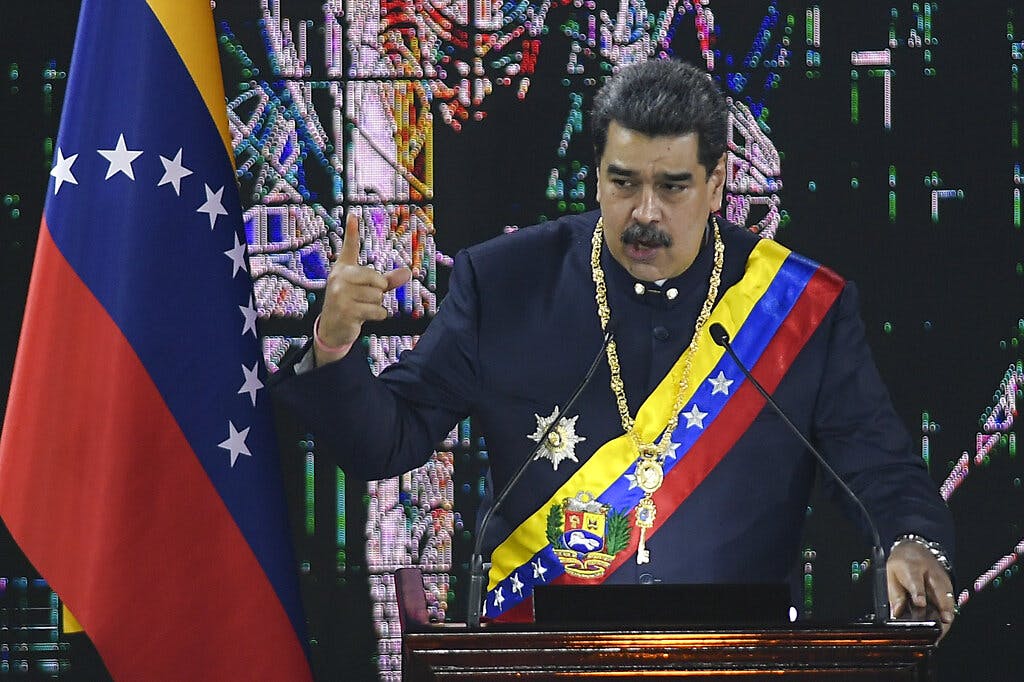Venezuela Frees American After Secret U.S. Visit, Sources Say
The release came hours after President Maduro signaled an interest in improving relations with America amid Russia’s invasion of Ukraine and concerns over rising gas prices.

CARACAS, Venezuela — The Venezuelan government freed at least one jailed American on Tuesday night as it seeks to improve relations with the Biden administration, which is looking to undercut support for Russia in Latin America.
A nongovernmental group that tracks arbitrary detentions and another person familiar with the matter confirmed to the Associated Press the release of Gustavo Cardenas, one of six oil executives jailed for more than four years.
The move follows a secret weekend visit to Venezuela by senior Biden administration officials, including the top White House official on Latin America and the State Department’s top hostage negotiator. The White House press secretary, Jen Psaki, told reporters Tuesday that “there were a range of topics discussed during that trip, including the health and welfare of detained U.S. citizens.”
The release came hours after President Maduro signaled an interest in improving relations with America amid Russia’s invasion of Ukraine and concerns in the United States over rising gas prices.
The State Department declined to comment Tuesday evening. But Mr. Cardenas’s release was confirmed by Foro Penal, a nongovernmental group, and by a person familiar with the matter who was not authorized to discuss the issue by name and spoke on condition of anonymity.
The special presidential envoy for hostage affairs, Roger Carstens, came home empty-handed from a previous trip to Caracas in December. But he returned to Venezuela this weekend with other administration officials including the National Security Council director for the Western Hemisphere, Juan Gonzalez, and Ambassador James Story, who heads the U.S. government’s Venezuelan Affairs Unit out of neighboring Colombia.
Mr. Cardenas and five other executives of Houston-based Citgo, a subsidiary of Venezuela’s state-owned oil giant, had been in detention in Venezuela since 2017 and sentenced to prison over a never-executed plan to refinance billions of dollars in the oil company’s bonds. The U.S. government has pressed for their release.
Three other Americans are also being held in Venezuela — two Green Berets, Mark Denman and Airan Berry, who were arrested for their involvement in a confusing plot to overthrow Mr. Maduro, and a U.S. Marine, Matthew Heath, detained on weapons charges.
A lawyer and vice president director of Foro Penal, Gonzalo Himiob, said in a statement that the end of an arbitrary detention should be celebrated but warned of the consequences that can come from an agreement like the one that led to Mr. Cardenas’s release.
“The release of any political prisoner, when it arises from an agreement between political actors, and not from respect for the law, confirms that from the beginning the reasons for the detention were neither legal nor valid, but political and, consequently, arbitrary and contrary to human rights,” Mr. Himiob said.
The weekend discussions came a little more than three years after the U.S. broke off relations with Mr. Maduro and recognized an opposition leader, Juan Guaidó, as Venezuela’s legitimate leader. The talks came together after months of backchannel efforts by intermediaries — American lobbyists, Norwegian diplomats, and international oil executives — who have been pushing for President Biden to revisit the so-far-unsuccessful “maximum pressure” campaign to unseat Mr. Maduro that he inherited from the Trump administration.
The impetus for the outreach to Mr. Maduro, who has been sanctioned and is indicted in New York on drug trafficking charges, took on added urgency following Russia’s invasion of Ukraine and ensuing U.S. sanctions. The Ukraine crisis promises to reshuffle global alliances and add to rising gas prices driving inflation already at a four-decade high.
Powerful Democrats and Republicans alike on Capitol Hill last week began voicing support for a U.S. ban on Russian oil and natural gas imports as the next step to punish President Putin for the invasion.
Venezuela is Mr. Putin’s top ally in Latin America and a top oil exporter. Its reentry into U.S. energy markets could mitigate the fallout at the pump from a possible oil embargo on Russia. But the discussions in Caracas were quickly condemned by top Democrat and Republican senators.
Senator Menendez, the Democratic chairman of the Senate Foreign Relations Committee, said Mr. Biden’s efforts to unite the world against Mr. Putin “should not be undercut by propping up” Mr. Maduro, whose government is under investigation by the International Criminal Court for possible crimes against humanity committed against protesters in 2017.
By REGINA GARCIA CANO, JOSHUA GOODMAN and ERIC TUCKER
